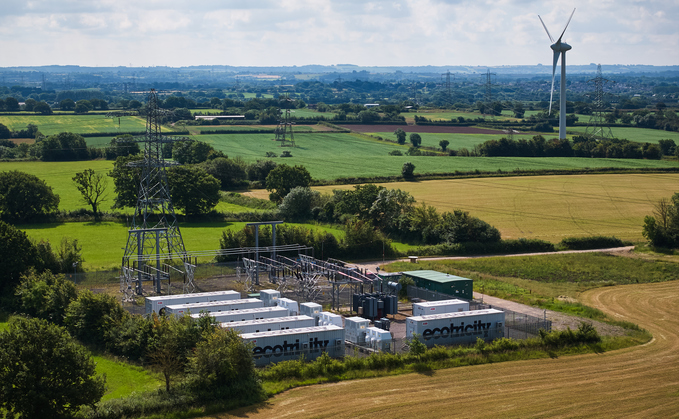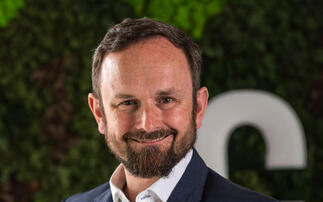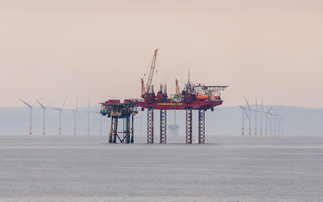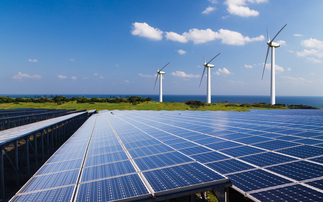
Credit: Ecotricity
Ecotricity's senior sustainability manager reflects on studying 'chemical engineering with a conscience' and how businesses and the public are 'flatly rejecting' claims climate action is too expensive
Founded in 1995 by entrepreneur Dale Vince, Ecotricity is the world's first green energy company. Having started with a solitary windmill on a hill in Stroud, Gloucestershire, the firm now owns 24 wind parks all over the country which are home to 74 windmills, as well as three sun parks and a green gas mill. The company founded the Global Green Energy Movement and is committed to ending fossil fuels.
Ecotricity's senior manager for sustainability, Paul Bowtell, has led sustainability and ESG teams across the retail and energy sectors. He produced Sainsbury's first Environment Report in 1995, became Asda's first environmental professional, and worked at the Audit Commission.
Bowtell has also been a consultant at Wimpey Environmental, Halcrow, and Atkins, where he advised clients in defence, government, and the private sector on environmental management systems, green procurement, and waste and energy management.
BusinessGreen: What was your first role in the green economy and what attracted you to the sector?
Paul Bowtell: I started as an energy efficiency consultant in 1990. My degree was an early environmental one, our lecturers termed it "chemical engineering with a conscience". This raised my concern and fired my interest.
Ecotricity is sponsoring the 'Sustainability Leader of the Year' category at this year's UK Green Business Awards - What do you think good leadership looks like within sustainability?
Consultative, open minded, and prepared to hang in there for the long game. A good sense of humour and some self-deprecation can go a long way too.
How is Ecotricity embodying these values in its work within the green economy?
We were the first company in the world to sell renewable energy commercially and have been plugging away for 30 years. Over that time, our founder Dale Vince has invested in a wide variety of innovative green tech and has constantly pushed a positive message of 'we can make change and there are benefits to doing so'. There is always 'another way' when it comes to finding solutions for the green economy.
What parts of the green economy are you most excited about?
New developments happen all the time. I think what gives me most hope is that the general public and businesses are flatly rejecting the efforts by some to say climate action is a waste of time and too expensive.
What developments do you think are currently under the radar?
I think for those not working in the field, many changes catch them by surprise. In reality, some areas are moving at pace. No more coal for electricity generation in the UK, the rapid uptake of electric vehicles, and improvements in building energy efficiency are a few examples.
What is the biggest misconception about the green economy?
A common misconception is that green is still niche - for the eccentric and affluent - and most people are not interested. The simple fact is, most people do act and spend with green in mind, not all the time, but much more than some want to believe.
What do you see as the biggest challenges to the net zero transition?
There are many, but vacillation by politicians, gives some the excuse to defer action. The science is clear, the actions we need to take are known. Stop kicking cans down the road. The planet's survival should not be a political football.
What advice would you give to someone looking to work in the green economy?
Be prepared to listen and persuade, not lecture. Passion and energy are great, but an understanding of bringing people with you - which can take time - is key. Also, don't just preach to the converted, get outside the bubble and get more people and businesses on the right track.
What green initiatives can we expect to see in the coming years?
Greener homes - both in the way they are built and can be powered, more reuse systems first in B2B and then B2C, and hopefully the increase of items built for repair and upgrade, rather than built in obsolescence.
What can the green economy do to better promote its successes?
Don't just talk about green, talk about employment opportunities, cost saving, less waste, how cool and well-designed things are.
What would your green superpower be?
The ability to keep slugs off my flowers. I know slugs do have a place in the ecosystem... but just ideally not near my flowers.
Paul Bowtell is senior manager, sustainability, at Ecotricity
Ecotricity is the sponsor of the Sustainability Leader of the Year award at the UK Green Business Awards 2025, which takes place on the evening of 11 June at The Brewery in London. You can reserve your place at the awards here.







